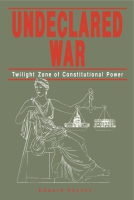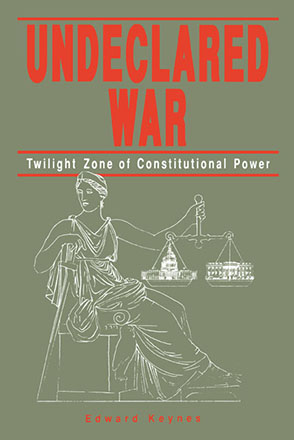Undeclared War
Twilight Zone of Constitutional Power
Edward Keynes
“This book deals with a great issue of constitutional government—how to allocate the power to make war. Only Congress can declare war, but formally declared wars are rare. The interesting questions under our Constitution concern how it allocates the power to engage in undeclared hostilities, or to authorize military or diplomatic measures that may lead to war. As Edward Keynes’s subtitle suggests, these issues are in the ‘Twilight Zone of Constitutional Power’. . . . The book is well written and interesting. The summary of the litigation sparked by the war in Vietnam is valuable.”
- Description
- Reviews
- Bio
- Subjects
A major feature of the book is a thorough analysis of all the legal challenges to the President's conduct of the Vietnam War. The Vietnam cases are examined in light of British constitutional history, the framing, of the American Constitution, and judicial decisions from 1800 through the Korean War. This analysis furnishes the basis for the author's contention that the Supreme Court has led the nation into the "twilight zone of concurrent power"—encouraging "the legislature and the executive to fuse their separate powers of war and defense into a national war power whose only standard is the extraconstitutional one of success on the battlefield."
In the modern era of guerrilla wars, national liberation movements, and police actions, the author recognizes the inadequacy of traditional distinctions between defensive and offensive wars upon which the Framers of the American Constitution divided the congressional war powers from the office of commander in Chief. Keynes concludes that, although the courts can play a limited role in restraining presidential power to conduct undeclared war, only Congress can effectively limit the President's conduct by insisting on a prior consensus regarding military intervention.
“This book deals with a great issue of constitutional government—how to allocate the power to make war. Only Congress can declare war, but formally declared wars are rare. The interesting questions under our Constitution concern how it allocates the power to engage in undeclared hostilities, or to authorize military or diplomatic measures that may lead to war. As Edward Keynes’s subtitle suggests, these issues are in the ‘Twilight Zone of Constitutional Power’. . . . The book is well written and interesting. The summary of the litigation sparked by the war in Vietnam is valuable.”
“This book is clearly written, conceptually tight, and a worthy addition to constitutional literature.”
“Keynes raises anew the questions suggested by the Vietnam conflict and an intelligent book which avoids hyperbole and the polemic thrust of much earlier writing. . . . The volume makes excellent use of broad-based literature and can serve as an extensive bibliographical source. Indeed, it might even be regarded as a basic primer in American constitutional theory which includes extensive elaboration of war powers concerns.”
“Keynes’s treatment of pertinent judicial decisions, especially those spawned by the Indochina conflict, is among the most complete now available.”
“A fresh examination of the 200-year-old question of presidential and congressional powers in military action and foreign policy, looking particularly at the accretion of power in the hands of the President and the degree to which the judicial branch has attempted, or should attempt, to make decisions in the twilight zone. It is a searching inquiry, ranging from the early years of the republic to the Vietnam War.”
“This well-organized and cogently written volume is accessible to upper-division students in history and political science. Treatment of the scholarly literature is extensive, and the credentials of the author are well established. A necessary acquisition on the presidency for academic libraries.
Selected as ‘An Outstanding Academic Book for 1983.’”
Edward Keynes is the author, co-author, or co-editor of eight other books on American politics and constitutional law, including The Court vs. Congress: Prayer, Busing, and Abortion (1989). He has been a consultant to the U.S. House of Representatives and the General Assembly of Pennsylvania. Mr. Keynes is Professor of Political Science at The Pennsylvania State University and has been visiting professor at the universities of Cologne, Kiel, and Marburg. A University of Wisconsin Ph.D., he has been a Fullbright and an Alexander von Humboldt fellow.
Mailing List
Subscribe to our mailing list and be notified about new titles, journals and catalogs.




